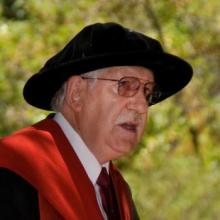John and Ken begin the show by briefly introducing Popper's central idea of falsification and how it might apply to very recent theoretical scientific ideas like string theory. John notes that just because falsifiability was the essential and necessary criteria for what Popper considered science does not mean that Popper thought non-falsifiable things were useless, just that they were not scientific. Ken tries to flesh out more about falsification, and asks John to detail how Popper thought his central tenet solved Hume's problem of induction. John first discusses the problem of induction and then explains how Popper thought Hume's position got the nature of scientific inquiry backwards. Ken notes that in Popper's theory there is never undeniable and final evidence for something, but only a series of more convincing failures to disprove a theory.
Ken introduces this week's guest, Denis Phillips, Professor of Education and Philosophy at Stanford University. John begins by asking Denis to talk about the origins of Popper's ideas, and Denis discusses how Karl Popper first began thinking about the philosophy of science because of his friends' strict adherence to the once popular views of Marxism and Freudianism, which they thought could explain everything. At the young age of seventeen Popper had supposedly formulated the demarcation between science and pseudo-science through the use of his criterion of falsifiability--which noticed that real scientific inquiry was characterized by the inability to explain everything. Ken and John discuss Vienna's interesting marketplace of ideas at the time, including the famous Vienna Circle of logical positivists, which Popper hovered around. Denis discusses the famous exchange between Wittgenstein and Popper that is detailed in the book Wittgenstein's Poker.
Ken returns to the problem of demarcation, and presses Denis to explain why the philosophy of science made this such a central problem during Popper's time. Denis and Ken then discuss the practical and theoretical implications of the demarcation between science and non-science, as well as how Popper's views differed from those of the logical positivists. Denis then discusses the relationship between metaphysics in one age and scientific exploration in another. John brings up the difference between "pre-science" and "pseudo-science" in Popper's view.
John and Ken return to Hume's problem of induction, and Denis Phillips explains how Popper felt that inductive reasoning was invalid as presented by Hume, and took it upon himself to show how science could be possible with a different mechanism than the one Hume suggests. John points out that Popper dissolves the problem rather than really solving it, because in essence he believes that Hume is right about induction, but wrong that induction is necessarily the backbone of scientific investigation. Ken tries to push against Popper's claims and arguments, questioning some of his fundamental assumptions, returning to the fact that in his view there is never really any final confirmation of a scientific theory, but only a buildup of evidence in favor of one theory or another. John brings up an interesting anecdote about an exchange between a working scientist and Karl Popper which questions whether Popper applied his theories to his own work.
Ken questions how knowledge grows in Popper's theory, and how scientists decide what propositions get tested and what theories get ignored. Denis refers to this problem as a "whiff of induction" problem because in his answer Popper seems to reference induction in order to explain why a theory which has passed tests is more preferable than one that has yet to be tested. John and Ken continue to discuss Popper's ideas and their practical applications to scientific endeavors, as well as Popper's interesting thoughts on free society and politics. Callers bring up points about the usefulness of demarcation and the feasibility of Popper's framework.
- Roving Philosophical Report (Seek to 4:31): Polly Stryker interviews Peter Godfrey-Smith from Harvard University about Popper's views and how they may be more applicable to small and medium sized scientific changes than large scale scientific revolutions.
- Conundrum about Disease Outbreak Preparedness (Seek to 46:01): A woman from San Francisco who is in charge of health and safety at her company asks John and Ken to help her decide whether stockpiling flu medications (and thereby taking them out of circulation) to prepare for a possible disease outbreak is ethical or not.



